Educational Psychology: Classroom Management Literature Review
VerifiedAdded on 2022/07/28
|10
|2553
|25
Report
AI Summary
This report presents a literature review on classroom management within the framework of educational psychology. It identifies disruptive student behaviors as a primary challenge, emphasizing the importance of teacher skills in maintaining an organized and focused learning environment. The review explores internal and external factors influencing classroom dynamics, drawing on research to highlight the impact of teacher-student relationships, student emotional development, and the need for positive classroom environments. The report then discusses research-based interventions rooted in behavioral theory, including establishing clear behavioral expectations, monitoring student conduct, redirecting inappropriate behaviors, and reinforcing positive actions. It underscores the significance of teacher awareness of individual student personalities and effective communication to foster a conducive learning atmosphere. The report concludes by advocating for a strategic approach to classroom management grounded in educational psychology to address behavioral challenges and promote student success.
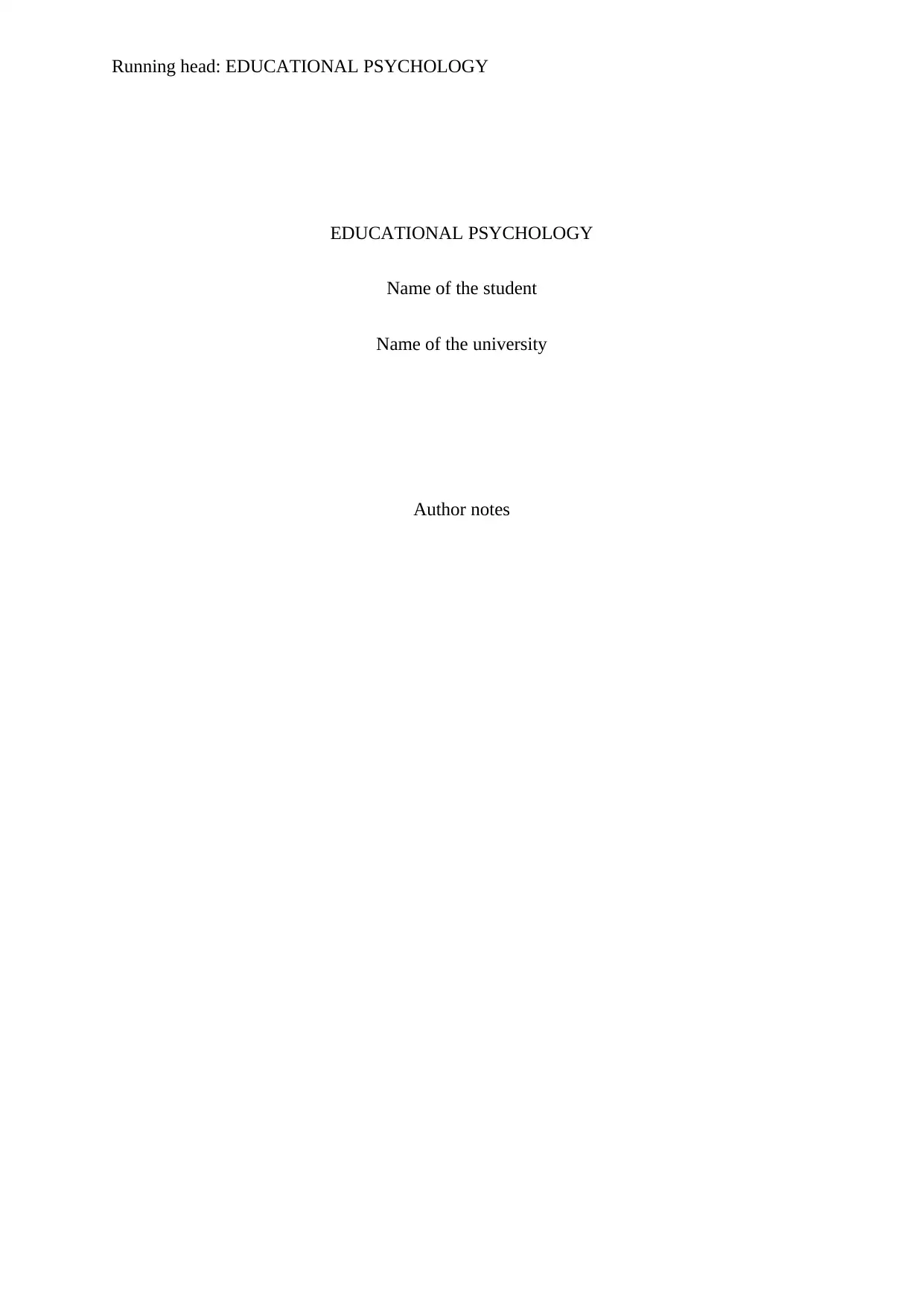
Running head: EDUCATIONAL PSYCHOLOGY
EDUCATIONAL PSYCHOLOGY
Name of the student
Name of the university
Author notes
EDUCATIONAL PSYCHOLOGY
Name of the student
Name of the university
Author notes
Paraphrase This Document
Need a fresh take? Get an instant paraphrase of this document with our AI Paraphraser
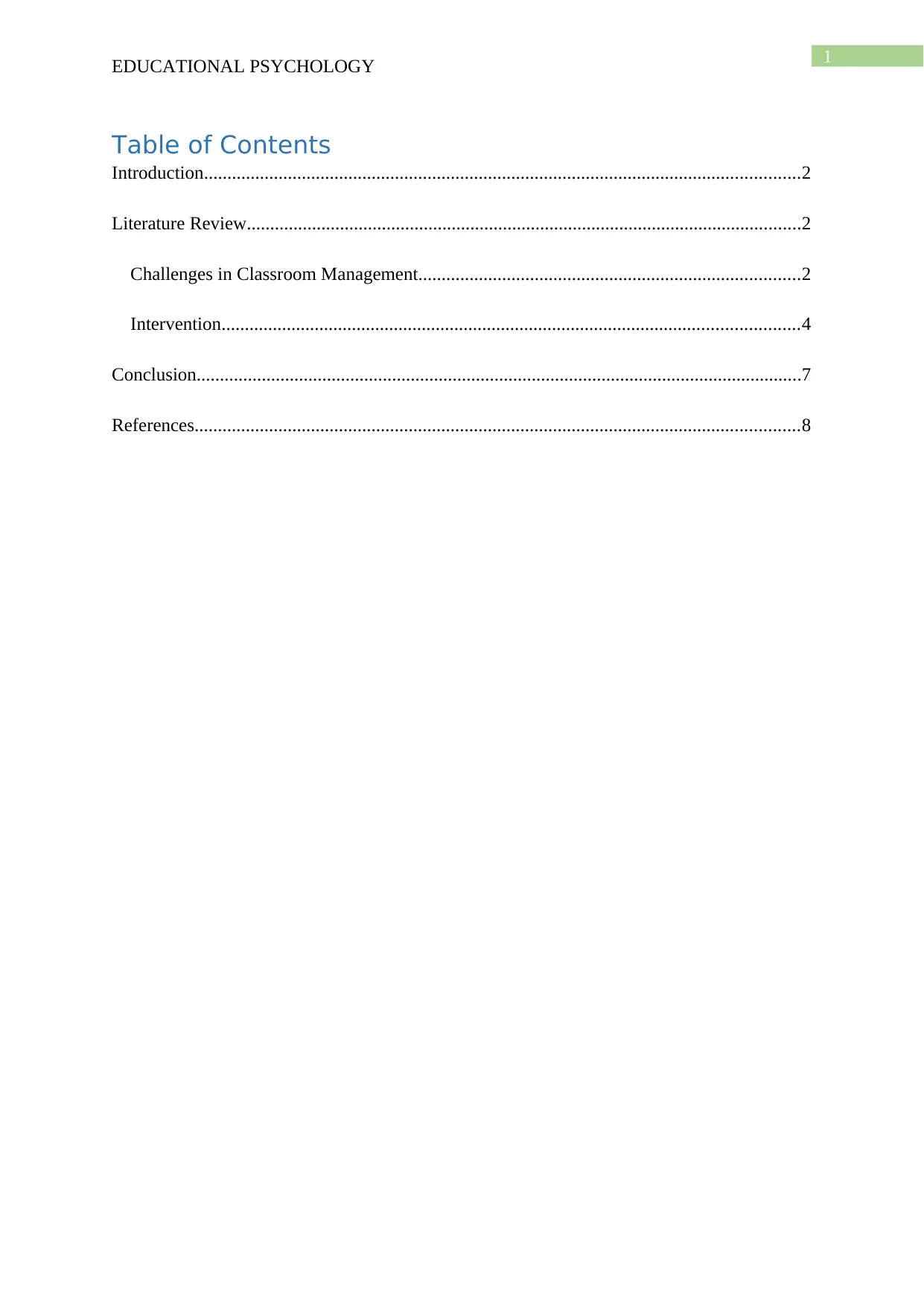
1
EDUCATIONAL PSYCHOLOGY
Table of Contents
Introduction................................................................................................................................2
Literature Review.......................................................................................................................2
Challenges in Classroom Management..................................................................................2
Intervention............................................................................................................................4
Conclusion..................................................................................................................................7
References..................................................................................................................................8
EDUCATIONAL PSYCHOLOGY
Table of Contents
Introduction................................................................................................................................2
Literature Review.......................................................................................................................2
Challenges in Classroom Management..................................................................................2
Intervention............................................................................................................................4
Conclusion..................................................................................................................................7
References..................................................................................................................................8
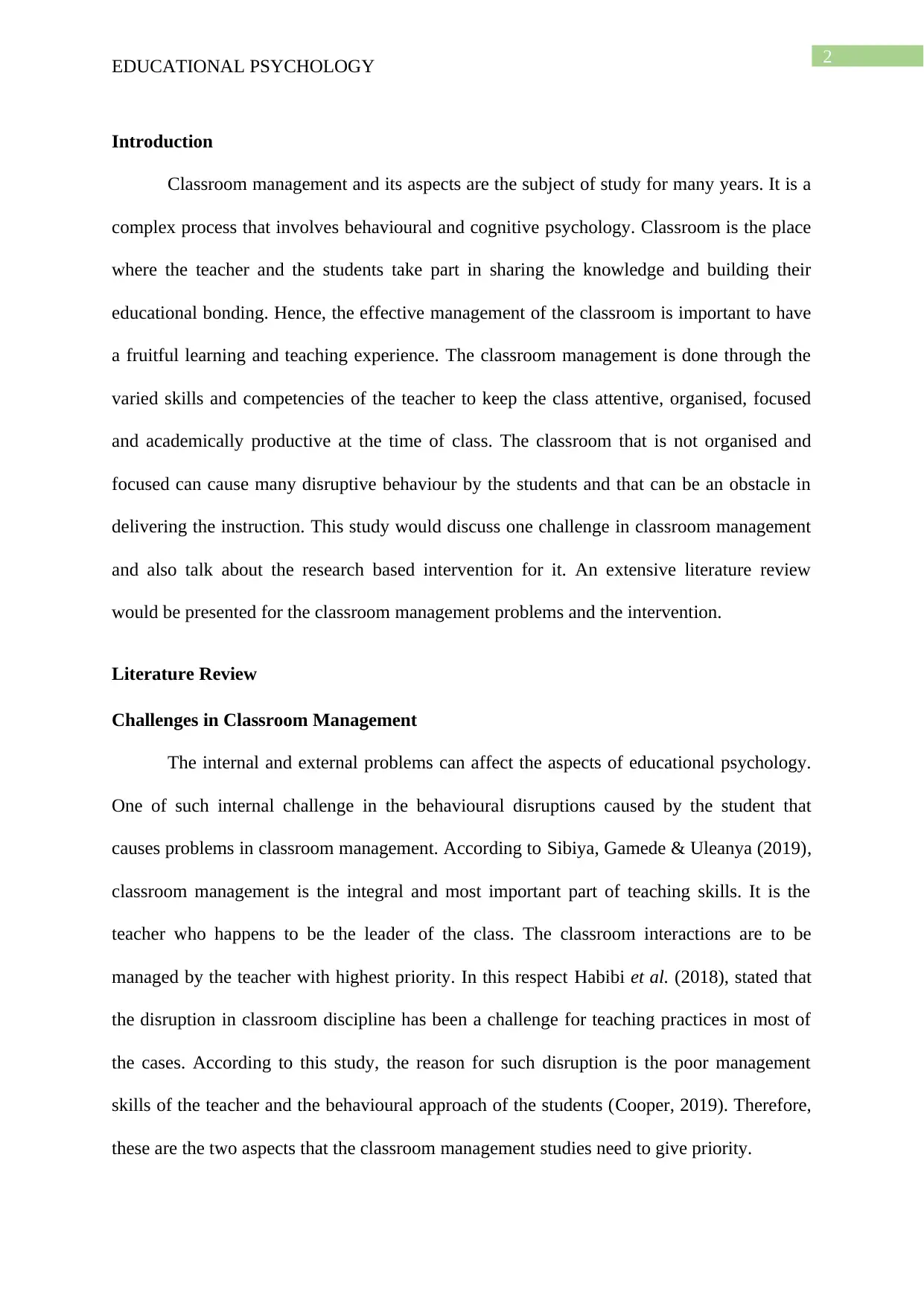
2
EDUCATIONAL PSYCHOLOGY
Introduction
Classroom management and its aspects are the subject of study for many years. It is a
complex process that involves behavioural and cognitive psychology. Classroom is the place
where the teacher and the students take part in sharing the knowledge and building their
educational bonding. Hence, the effective management of the classroom is important to have
a fruitful learning and teaching experience. The classroom management is done through the
varied skills and competencies of the teacher to keep the class attentive, organised, focused
and academically productive at the time of class. The classroom that is not organised and
focused can cause many disruptive behaviour by the students and that can be an obstacle in
delivering the instruction. This study would discuss one challenge in classroom management
and also talk about the research based intervention for it. An extensive literature review
would be presented for the classroom management problems and the intervention.
Literature Review
Challenges in Classroom Management
The internal and external problems can affect the aspects of educational psychology.
One of such internal challenge in the behavioural disruptions caused by the student that
causes problems in classroom management. According to Sibiya, Gamede & Uleanya (2019),
classroom management is the integral and most important part of teaching skills. It is the
teacher who happens to be the leader of the class. The classroom interactions are to be
managed by the teacher with highest priority. In this respect Habibi et al. (2018), stated that
the disruption in classroom discipline has been a challenge for teaching practices in most of
the cases. According to this study, the reason for such disruption is the poor management
skills of the teacher and the behavioural approach of the students (Cooper, 2019). Therefore,
these are the two aspects that the classroom management studies need to give priority.
EDUCATIONAL PSYCHOLOGY
Introduction
Classroom management and its aspects are the subject of study for many years. It is a
complex process that involves behavioural and cognitive psychology. Classroom is the place
where the teacher and the students take part in sharing the knowledge and building their
educational bonding. Hence, the effective management of the classroom is important to have
a fruitful learning and teaching experience. The classroom management is done through the
varied skills and competencies of the teacher to keep the class attentive, organised, focused
and academically productive at the time of class. The classroom that is not organised and
focused can cause many disruptive behaviour by the students and that can be an obstacle in
delivering the instruction. This study would discuss one challenge in classroom management
and also talk about the research based intervention for it. An extensive literature review
would be presented for the classroom management problems and the intervention.
Literature Review
Challenges in Classroom Management
The internal and external problems can affect the aspects of educational psychology.
One of such internal challenge in the behavioural disruptions caused by the student that
causes problems in classroom management. According to Sibiya, Gamede & Uleanya (2019),
classroom management is the integral and most important part of teaching skills. It is the
teacher who happens to be the leader of the class. The classroom interactions are to be
managed by the teacher with highest priority. In this respect Habibi et al. (2018), stated that
the disruption in classroom discipline has been a challenge for teaching practices in most of
the cases. According to this study, the reason for such disruption is the poor management
skills of the teacher and the behavioural approach of the students (Cooper, 2019). Therefore,
these are the two aspects that the classroom management studies need to give priority.
⊘ This is a preview!⊘
Do you want full access?
Subscribe today to unlock all pages.

Trusted by 1+ million students worldwide
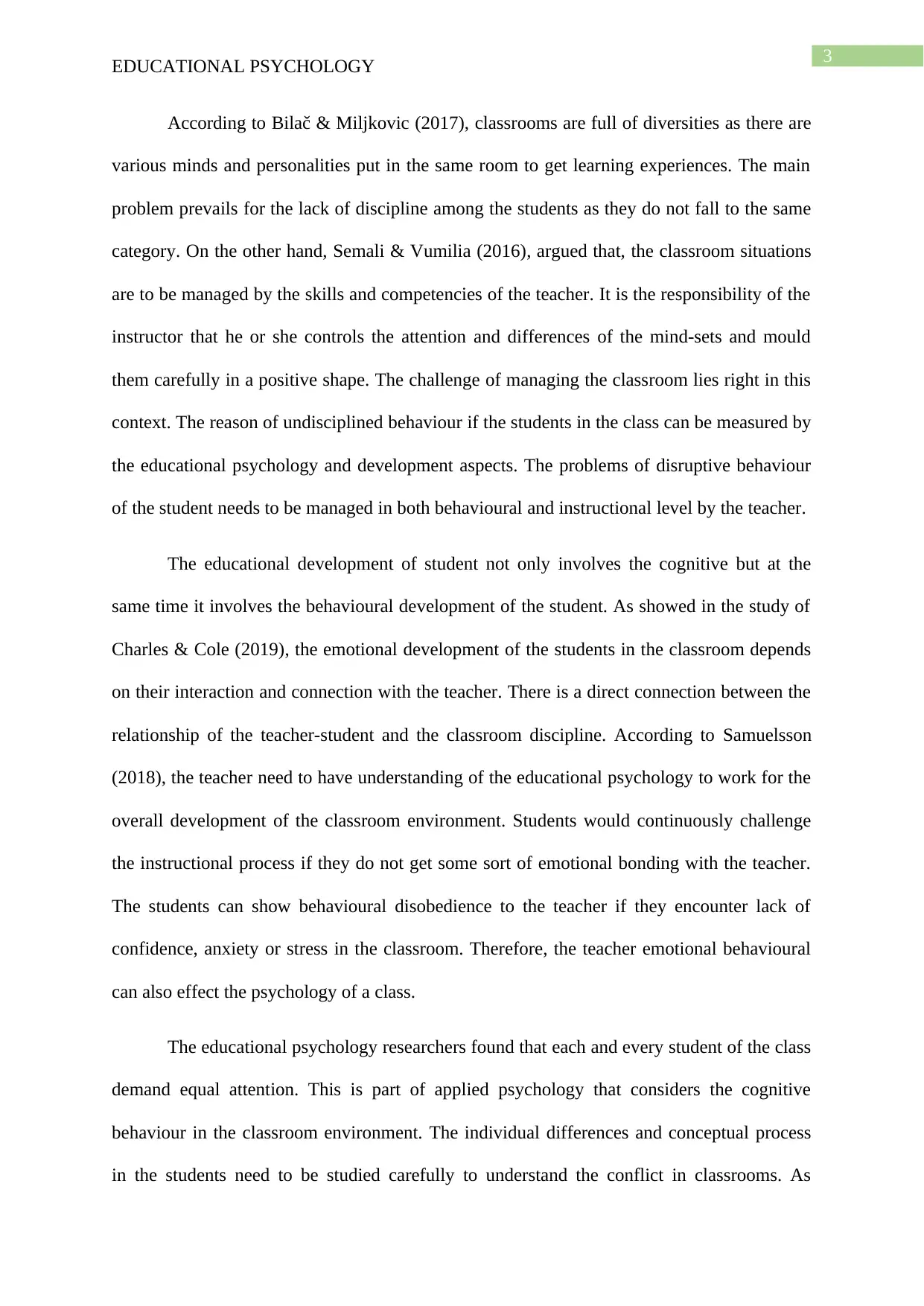
3
EDUCATIONAL PSYCHOLOGY
According to Bilač & Miljkovic (2017), classrooms are full of diversities as there are
various minds and personalities put in the same room to get learning experiences. The main
problem prevails for the lack of discipline among the students as they do not fall to the same
category. On the other hand, Semali & Vumilia (2016), argued that, the classroom situations
are to be managed by the skills and competencies of the teacher. It is the responsibility of the
instructor that he or she controls the attention and differences of the mind-sets and mould
them carefully in a positive shape. The challenge of managing the classroom lies right in this
context. The reason of undisciplined behaviour if the students in the class can be measured by
the educational psychology and development aspects. The problems of disruptive behaviour
of the student needs to be managed in both behavioural and instructional level by the teacher.
The educational development of student not only involves the cognitive but at the
same time it involves the behavioural development of the student. As showed in the study of
Charles & Cole (2019), the emotional development of the students in the classroom depends
on their interaction and connection with the teacher. There is a direct connection between the
relationship of the teacher-student and the classroom discipline. According to Samuelsson
(2018), the teacher need to have understanding of the educational psychology to work for the
overall development of the classroom environment. Students would continuously challenge
the instructional process if they do not get some sort of emotional bonding with the teacher.
The students can show behavioural disobedience to the teacher if they encounter lack of
confidence, anxiety or stress in the classroom. Therefore, the teacher emotional behavioural
can also effect the psychology of a class.
The educational psychology researchers found that each and every student of the class
demand equal attention. This is part of applied psychology that considers the cognitive
behaviour in the classroom environment. The individual differences and conceptual process
in the students need to be studied carefully to understand the conflict in classrooms. As
EDUCATIONAL PSYCHOLOGY
According to Bilač & Miljkovic (2017), classrooms are full of diversities as there are
various minds and personalities put in the same room to get learning experiences. The main
problem prevails for the lack of discipline among the students as they do not fall to the same
category. On the other hand, Semali & Vumilia (2016), argued that, the classroom situations
are to be managed by the skills and competencies of the teacher. It is the responsibility of the
instructor that he or she controls the attention and differences of the mind-sets and mould
them carefully in a positive shape. The challenge of managing the classroom lies right in this
context. The reason of undisciplined behaviour if the students in the class can be measured by
the educational psychology and development aspects. The problems of disruptive behaviour
of the student needs to be managed in both behavioural and instructional level by the teacher.
The educational development of student not only involves the cognitive but at the
same time it involves the behavioural development of the student. As showed in the study of
Charles & Cole (2019), the emotional development of the students in the classroom depends
on their interaction and connection with the teacher. There is a direct connection between the
relationship of the teacher-student and the classroom discipline. According to Samuelsson
(2018), the teacher need to have understanding of the educational psychology to work for the
overall development of the classroom environment. Students would continuously challenge
the instructional process if they do not get some sort of emotional bonding with the teacher.
The students can show behavioural disobedience to the teacher if they encounter lack of
confidence, anxiety or stress in the classroom. Therefore, the teacher emotional behavioural
can also effect the psychology of a class.
The educational psychology researchers found that each and every student of the class
demand equal attention. This is part of applied psychology that considers the cognitive
behaviour in the classroom environment. The individual differences and conceptual process
in the students need to be studied carefully to understand the conflict in classrooms. As
Paraphrase This Document
Need a fresh take? Get an instant paraphrase of this document with our AI Paraphraser
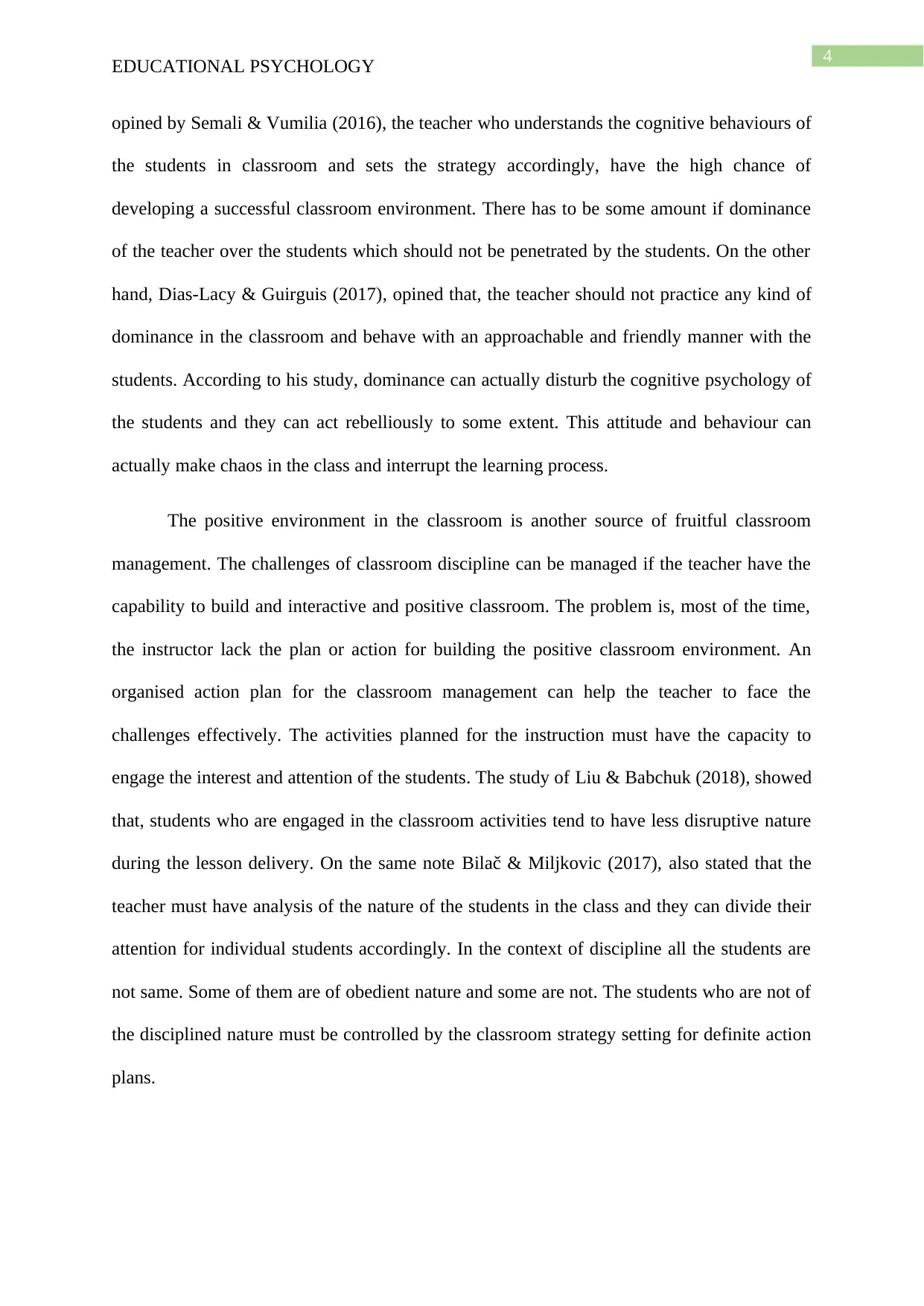
4
EDUCATIONAL PSYCHOLOGY
opined by Semali & Vumilia (2016), the teacher who understands the cognitive behaviours of
the students in classroom and sets the strategy accordingly, have the high chance of
developing a successful classroom environment. There has to be some amount if dominance
of the teacher over the students which should not be penetrated by the students. On the other
hand, Dias-Lacy & Guirguis (2017), opined that, the teacher should not practice any kind of
dominance in the classroom and behave with an approachable and friendly manner with the
students. According to his study, dominance can actually disturb the cognitive psychology of
the students and they can act rebelliously to some extent. This attitude and behaviour can
actually make chaos in the class and interrupt the learning process.
The positive environment in the classroom is another source of fruitful classroom
management. The challenges of classroom discipline can be managed if the teacher have the
capability to build and interactive and positive classroom. The problem is, most of the time,
the instructor lack the plan or action for building the positive classroom environment. An
organised action plan for the classroom management can help the teacher to face the
challenges effectively. The activities planned for the instruction must have the capacity to
engage the interest and attention of the students. The study of Liu & Babchuk (2018), showed
that, students who are engaged in the classroom activities tend to have less disruptive nature
during the lesson delivery. On the same note Bilač & Miljkovic (2017), also stated that the
teacher must have analysis of the nature of the students in the class and they can divide their
attention for individual students accordingly. In the context of discipline all the students are
not same. Some of them are of obedient nature and some are not. The students who are not of
the disciplined nature must be controlled by the classroom strategy setting for definite action
plans.
EDUCATIONAL PSYCHOLOGY
opined by Semali & Vumilia (2016), the teacher who understands the cognitive behaviours of
the students in classroom and sets the strategy accordingly, have the high chance of
developing a successful classroom environment. There has to be some amount if dominance
of the teacher over the students which should not be penetrated by the students. On the other
hand, Dias-Lacy & Guirguis (2017), opined that, the teacher should not practice any kind of
dominance in the classroom and behave with an approachable and friendly manner with the
students. According to his study, dominance can actually disturb the cognitive psychology of
the students and they can act rebelliously to some extent. This attitude and behaviour can
actually make chaos in the class and interrupt the learning process.
The positive environment in the classroom is another source of fruitful classroom
management. The challenges of classroom discipline can be managed if the teacher have the
capability to build and interactive and positive classroom. The problem is, most of the time,
the instructor lack the plan or action for building the positive classroom environment. An
organised action plan for the classroom management can help the teacher to face the
challenges effectively. The activities planned for the instruction must have the capacity to
engage the interest and attention of the students. The study of Liu & Babchuk (2018), showed
that, students who are engaged in the classroom activities tend to have less disruptive nature
during the lesson delivery. On the same note Bilač & Miljkovic (2017), also stated that the
teacher must have analysis of the nature of the students in the class and they can divide their
attention for individual students accordingly. In the context of discipline all the students are
not same. Some of them are of obedient nature and some are not. The students who are not of
the disciplined nature must be controlled by the classroom strategy setting for definite action
plans.
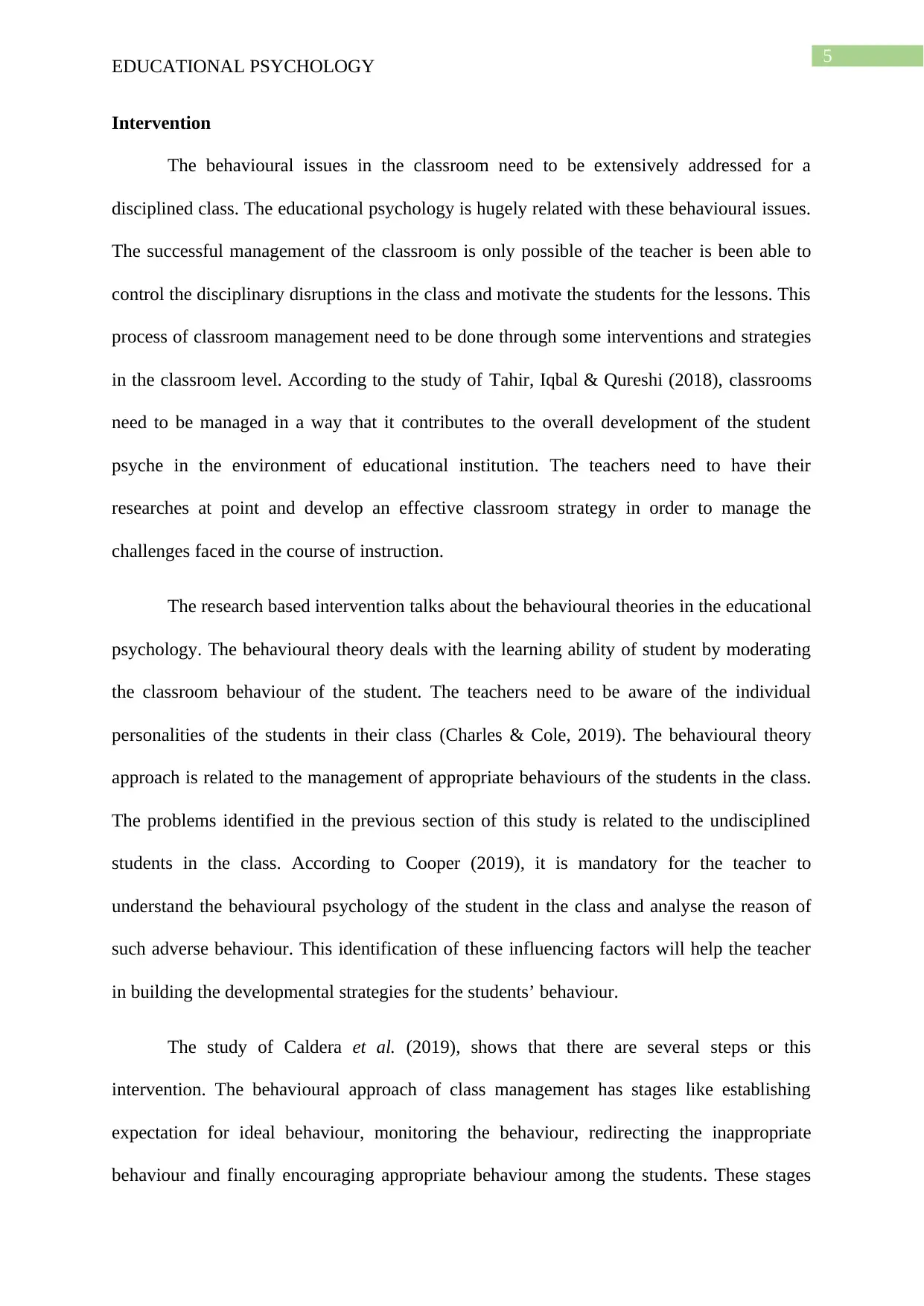
5
EDUCATIONAL PSYCHOLOGY
Intervention
The behavioural issues in the classroom need to be extensively addressed for a
disciplined class. The educational psychology is hugely related with these behavioural issues.
The successful management of the classroom is only possible of the teacher is been able to
control the disciplinary disruptions in the class and motivate the students for the lessons. This
process of classroom management need to be done through some interventions and strategies
in the classroom level. According to the study of Tahir, Iqbal & Qureshi (2018), classrooms
need to be managed in a way that it contributes to the overall development of the student
psyche in the environment of educational institution. The teachers need to have their
researches at point and develop an effective classroom strategy in order to manage the
challenges faced in the course of instruction.
The research based intervention talks about the behavioural theories in the educational
psychology. The behavioural theory deals with the learning ability of student by moderating
the classroom behaviour of the student. The teachers need to be aware of the individual
personalities of the students in their class (Charles & Cole, 2019). The behavioural theory
approach is related to the management of appropriate behaviours of the students in the class.
The problems identified in the previous section of this study is related to the undisciplined
students in the class. According to Cooper (2019), it is mandatory for the teacher to
understand the behavioural psychology of the student in the class and analyse the reason of
such adverse behaviour. This identification of these influencing factors will help the teacher
in building the developmental strategies for the students’ behaviour.
The study of Caldera et al. (2019), shows that there are several steps or this
intervention. The behavioural approach of class management has stages like establishing
expectation for ideal behaviour, monitoring the behaviour, redirecting the inappropriate
behaviour and finally encouraging appropriate behaviour among the students. These stages
EDUCATIONAL PSYCHOLOGY
Intervention
The behavioural issues in the classroom need to be extensively addressed for a
disciplined class. The educational psychology is hugely related with these behavioural issues.
The successful management of the classroom is only possible of the teacher is been able to
control the disciplinary disruptions in the class and motivate the students for the lessons. This
process of classroom management need to be done through some interventions and strategies
in the classroom level. According to the study of Tahir, Iqbal & Qureshi (2018), classrooms
need to be managed in a way that it contributes to the overall development of the student
psyche in the environment of educational institution. The teachers need to have their
researches at point and develop an effective classroom strategy in order to manage the
challenges faced in the course of instruction.
The research based intervention talks about the behavioural theories in the educational
psychology. The behavioural theory deals with the learning ability of student by moderating
the classroom behaviour of the student. The teachers need to be aware of the individual
personalities of the students in their class (Charles & Cole, 2019). The behavioural theory
approach is related to the management of appropriate behaviours of the students in the class.
The problems identified in the previous section of this study is related to the undisciplined
students in the class. According to Cooper (2019), it is mandatory for the teacher to
understand the behavioural psychology of the student in the class and analyse the reason of
such adverse behaviour. This identification of these influencing factors will help the teacher
in building the developmental strategies for the students’ behaviour.
The study of Caldera et al. (2019), shows that there are several steps or this
intervention. The behavioural approach of class management has stages like establishing
expectation for ideal behaviour, monitoring the behaviour, redirecting the inappropriate
behaviour and finally encouraging appropriate behaviour among the students. These stages
⊘ This is a preview!⊘
Do you want full access?
Subscribe today to unlock all pages.

Trusted by 1+ million students worldwide
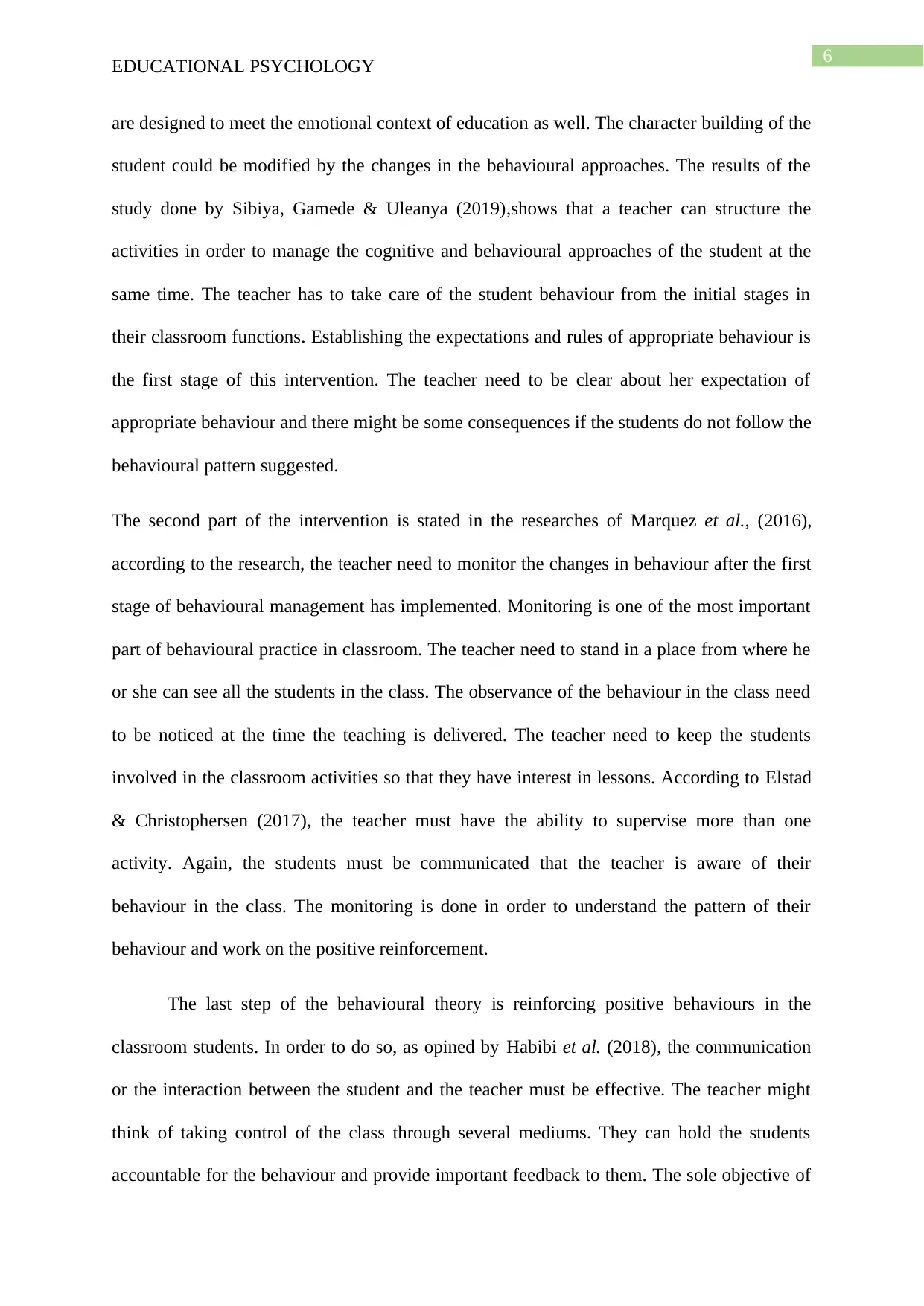
6
EDUCATIONAL PSYCHOLOGY
are designed to meet the emotional context of education as well. The character building of the
student could be modified by the changes in the behavioural approaches. The results of the
study done by Sibiya, Gamede & Uleanya (2019),shows that a teacher can structure the
activities in order to manage the cognitive and behavioural approaches of the student at the
same time. The teacher has to take care of the student behaviour from the initial stages in
their classroom functions. Establishing the expectations and rules of appropriate behaviour is
the first stage of this intervention. The teacher need to be clear about her expectation of
appropriate behaviour and there might be some consequences if the students do not follow the
behavioural pattern suggested.
The second part of the intervention is stated in the researches of Marquez et al., (2016),
according to the research, the teacher need to monitor the changes in behaviour after the first
stage of behavioural management has implemented. Monitoring is one of the most important
part of behavioural practice in classroom. The teacher need to stand in a place from where he
or she can see all the students in the class. The observance of the behaviour in the class need
to be noticed at the time the teaching is delivered. The teacher need to keep the students
involved in the classroom activities so that they have interest in lessons. According to Elstad
& Christophersen (2017), the teacher must have the ability to supervise more than one
activity. Again, the students must be communicated that the teacher is aware of their
behaviour in the class. The monitoring is done in order to understand the pattern of their
behaviour and work on the positive reinforcement.
The last step of the behavioural theory is reinforcing positive behaviours in the
classroom students. In order to do so, as opined by Habibi et al. (2018), the communication
or the interaction between the student and the teacher must be effective. The teacher might
think of taking control of the class through several mediums. They can hold the students
accountable for the behaviour and provide important feedback to them. The sole objective of
EDUCATIONAL PSYCHOLOGY
are designed to meet the emotional context of education as well. The character building of the
student could be modified by the changes in the behavioural approaches. The results of the
study done by Sibiya, Gamede & Uleanya (2019),shows that a teacher can structure the
activities in order to manage the cognitive and behavioural approaches of the student at the
same time. The teacher has to take care of the student behaviour from the initial stages in
their classroom functions. Establishing the expectations and rules of appropriate behaviour is
the first stage of this intervention. The teacher need to be clear about her expectation of
appropriate behaviour and there might be some consequences if the students do not follow the
behavioural pattern suggested.
The second part of the intervention is stated in the researches of Marquez et al., (2016),
according to the research, the teacher need to monitor the changes in behaviour after the first
stage of behavioural management has implemented. Monitoring is one of the most important
part of behavioural practice in classroom. The teacher need to stand in a place from where he
or she can see all the students in the class. The observance of the behaviour in the class need
to be noticed at the time the teaching is delivered. The teacher need to keep the students
involved in the classroom activities so that they have interest in lessons. According to Elstad
& Christophersen (2017), the teacher must have the ability to supervise more than one
activity. Again, the students must be communicated that the teacher is aware of their
behaviour in the class. The monitoring is done in order to understand the pattern of their
behaviour and work on the positive reinforcement.
The last step of the behavioural theory is reinforcing positive behaviours in the
classroom students. In order to do so, as opined by Habibi et al. (2018), the communication
or the interaction between the student and the teacher must be effective. The teacher might
think of taking control of the class through several mediums. They can hold the students
accountable for the behaviour and provide important feedback to them. The sole objective of
Paraphrase This Document
Need a fresh take? Get an instant paraphrase of this document with our AI Paraphraser
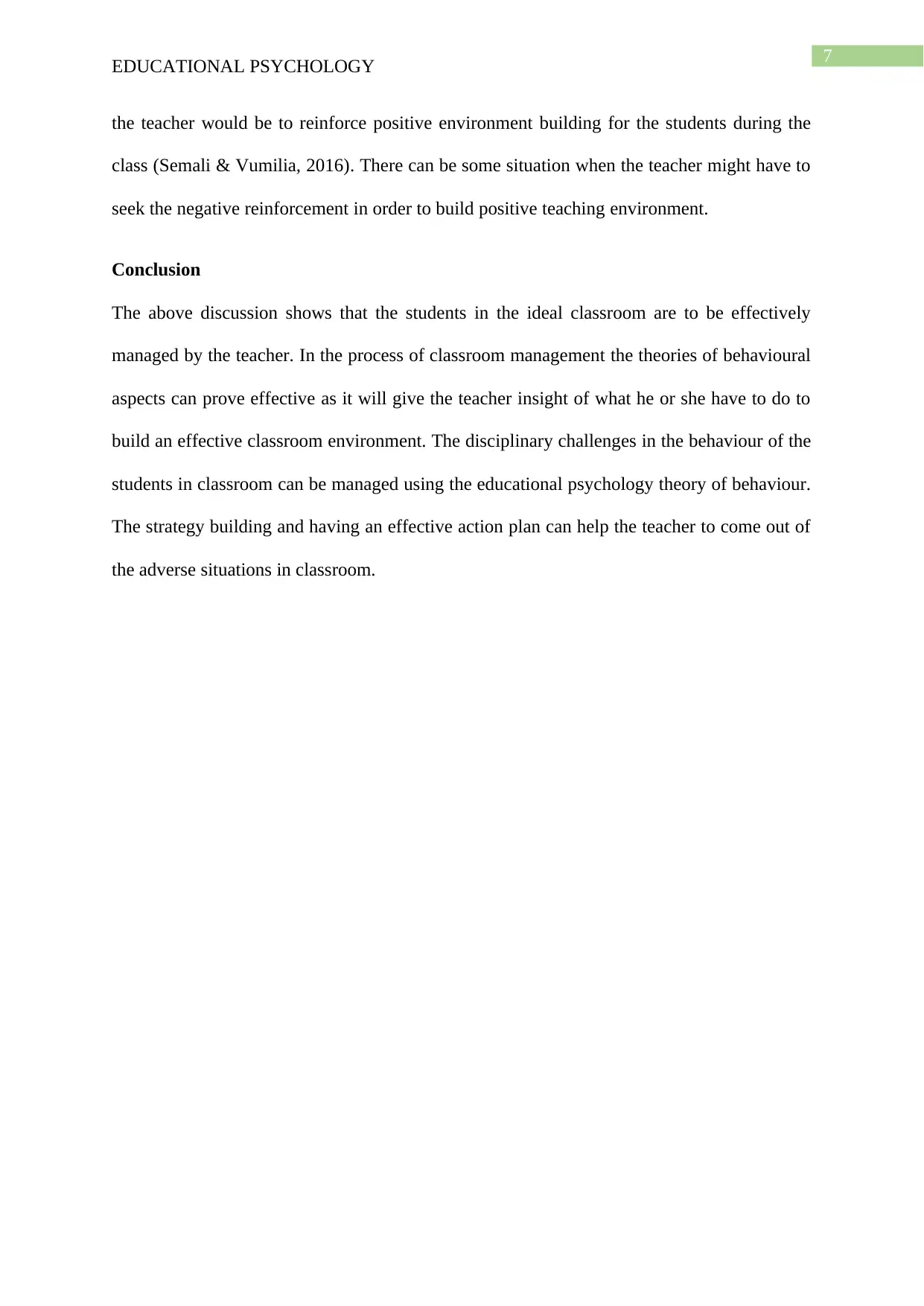
7
EDUCATIONAL PSYCHOLOGY
the teacher would be to reinforce positive environment building for the students during the
class (Semali & Vumilia, 2016). There can be some situation when the teacher might have to
seek the negative reinforcement in order to build positive teaching environment.
Conclusion
The above discussion shows that the students in the ideal classroom are to be effectively
managed by the teacher. In the process of classroom management the theories of behavioural
aspects can prove effective as it will give the teacher insight of what he or she have to do to
build an effective classroom environment. The disciplinary challenges in the behaviour of the
students in classroom can be managed using the educational psychology theory of behaviour.
The strategy building and having an effective action plan can help the teacher to come out of
the adverse situations in classroom.
EDUCATIONAL PSYCHOLOGY
the teacher would be to reinforce positive environment building for the students during the
class (Semali & Vumilia, 2016). There can be some situation when the teacher might have to
seek the negative reinforcement in order to build positive teaching environment.
Conclusion
The above discussion shows that the students in the ideal classroom are to be effectively
managed by the teacher. In the process of classroom management the theories of behavioural
aspects can prove effective as it will give the teacher insight of what he or she have to do to
build an effective classroom environment. The disciplinary challenges in the behaviour of the
students in classroom can be managed using the educational psychology theory of behaviour.
The strategy building and having an effective action plan can help the teacher to come out of
the adverse situations in classroom.
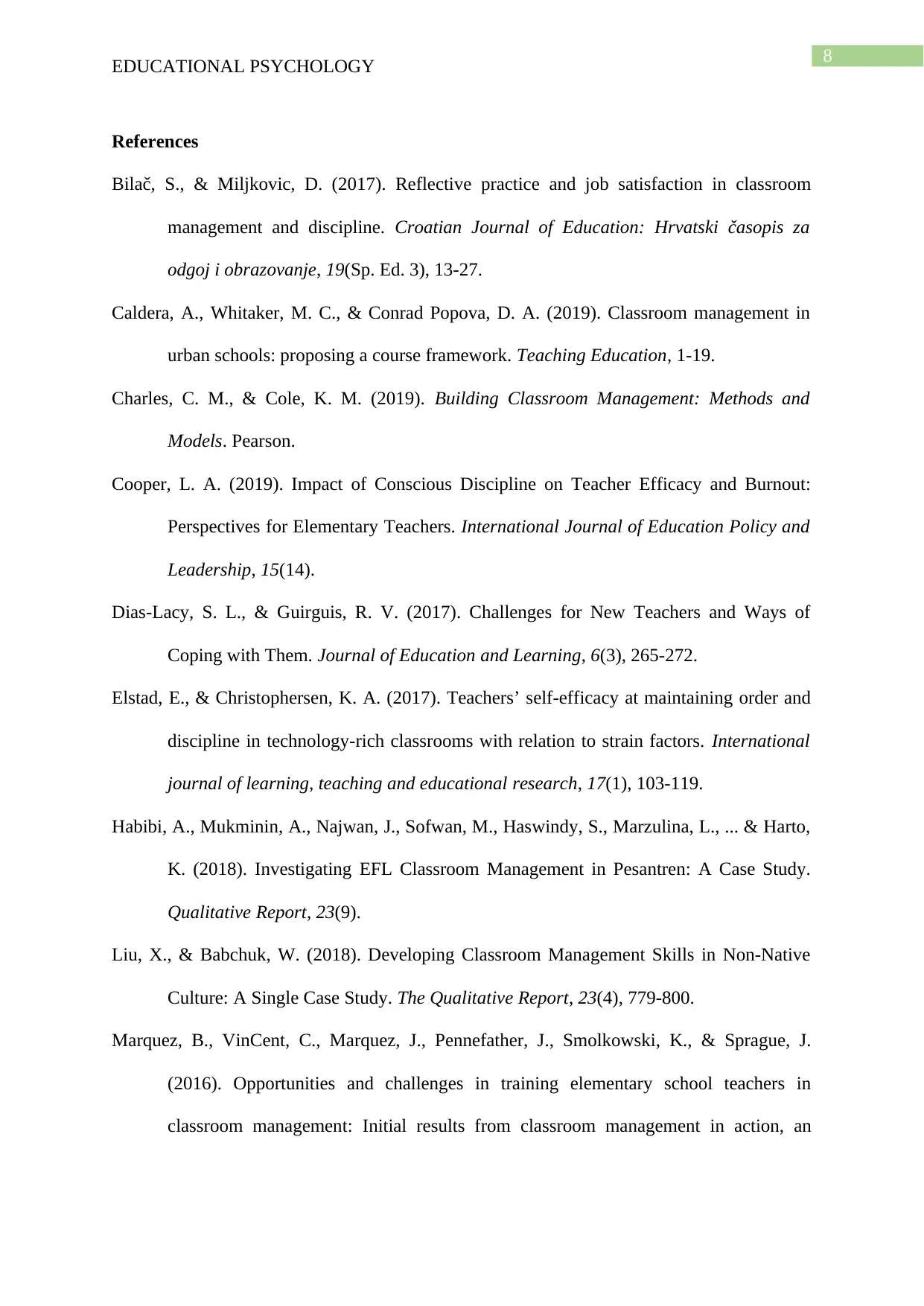
8
EDUCATIONAL PSYCHOLOGY
References
Bilač, S., & Miljkovic, D. (2017). Reflective practice and job satisfaction in classroom
management and discipline. Croatian Journal of Education: Hrvatski časopis za
odgoj i obrazovanje, 19(Sp. Ed. 3), 13-27.
Caldera, A., Whitaker, M. C., & Conrad Popova, D. A. (2019). Classroom management in
urban schools: proposing a course framework. Teaching Education, 1-19.
Charles, C. M., & Cole, K. M. (2019). Building Classroom Management: Methods and
Models. Pearson.
Cooper, L. A. (2019). Impact of Conscious Discipline on Teacher Efficacy and Burnout:
Perspectives for Elementary Teachers. International Journal of Education Policy and
Leadership, 15(14).
Dias-Lacy, S. L., & Guirguis, R. V. (2017). Challenges for New Teachers and Ways of
Coping with Them. Journal of Education and Learning, 6(3), 265-272.
Elstad, E., & Christophersen, K. A. (2017). Teachers’ self-efficacy at maintaining order and
discipline in technology-rich classrooms with relation to strain factors. International
journal of learning, teaching and educational research, 17(1), 103-119.
Habibi, A., Mukminin, A., Najwan, J., Sofwan, M., Haswindy, S., Marzulina, L., ... & Harto,
K. (2018). Investigating EFL Classroom Management in Pesantren: A Case Study.
Qualitative Report, 23(9).
Liu, X., & Babchuk, W. (2018). Developing Classroom Management Skills in Non-Native
Culture: A Single Case Study. The Qualitative Report, 23(4), 779-800.
Marquez, B., VinCent, C., Marquez, J., Pennefather, J., Smolkowski, K., & Sprague, J.
(2016). Opportunities and challenges in training elementary school teachers in
classroom management: Initial results from classroom management in action, an
EDUCATIONAL PSYCHOLOGY
References
Bilač, S., & Miljkovic, D. (2017). Reflective practice and job satisfaction in classroom
management and discipline. Croatian Journal of Education: Hrvatski časopis za
odgoj i obrazovanje, 19(Sp. Ed. 3), 13-27.
Caldera, A., Whitaker, M. C., & Conrad Popova, D. A. (2019). Classroom management in
urban schools: proposing a course framework. Teaching Education, 1-19.
Charles, C. M., & Cole, K. M. (2019). Building Classroom Management: Methods and
Models. Pearson.
Cooper, L. A. (2019). Impact of Conscious Discipline on Teacher Efficacy and Burnout:
Perspectives for Elementary Teachers. International Journal of Education Policy and
Leadership, 15(14).
Dias-Lacy, S. L., & Guirguis, R. V. (2017). Challenges for New Teachers and Ways of
Coping with Them. Journal of Education and Learning, 6(3), 265-272.
Elstad, E., & Christophersen, K. A. (2017). Teachers’ self-efficacy at maintaining order and
discipline in technology-rich classrooms with relation to strain factors. International
journal of learning, teaching and educational research, 17(1), 103-119.
Habibi, A., Mukminin, A., Najwan, J., Sofwan, M., Haswindy, S., Marzulina, L., ... & Harto,
K. (2018). Investigating EFL Classroom Management in Pesantren: A Case Study.
Qualitative Report, 23(9).
Liu, X., & Babchuk, W. (2018). Developing Classroom Management Skills in Non-Native
Culture: A Single Case Study. The Qualitative Report, 23(4), 779-800.
Marquez, B., VinCent, C., Marquez, J., Pennefather, J., Smolkowski, K., & Sprague, J.
(2016). Opportunities and challenges in training elementary school teachers in
classroom management: Initial results from classroom management in action, an
⊘ This is a preview!⊘
Do you want full access?
Subscribe today to unlock all pages.

Trusted by 1+ million students worldwide
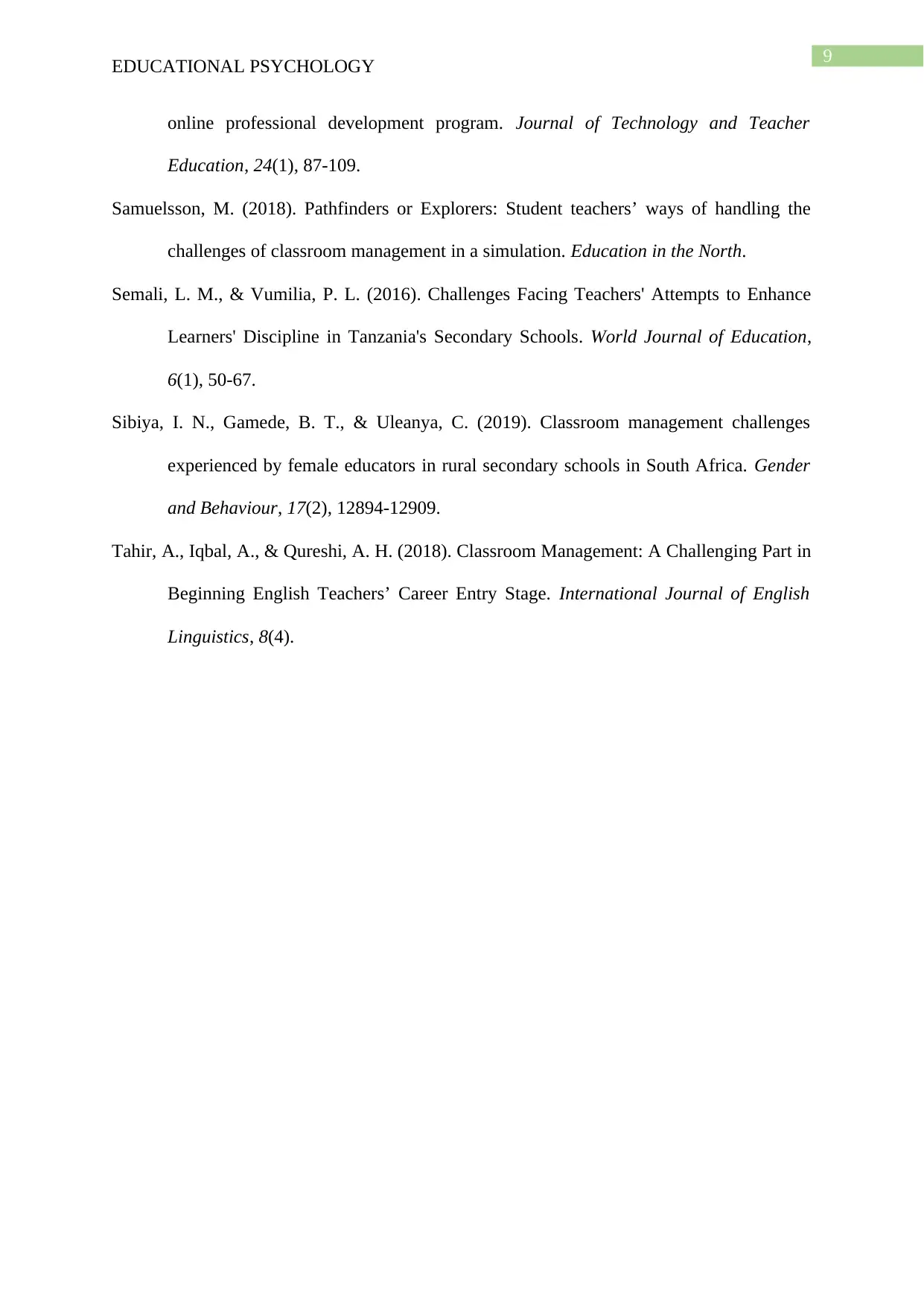
9
EDUCATIONAL PSYCHOLOGY
online professional development program. Journal of Technology and Teacher
Education, 24(1), 87-109.
Samuelsson, M. (2018). Pathfinders or Explorers: Student teachers’ ways of handling the
challenges of classroom management in a simulation. Education in the North.
Semali, L. M., & Vumilia, P. L. (2016). Challenges Facing Teachers' Attempts to Enhance
Learners' Discipline in Tanzania's Secondary Schools. World Journal of Education,
6(1), 50-67.
Sibiya, I. N., Gamede, B. T., & Uleanya, C. (2019). Classroom management challenges
experienced by female educators in rural secondary schools in South Africa. Gender
and Behaviour, 17(2), 12894-12909.
Tahir, A., Iqbal, A., & Qureshi, A. H. (2018). Classroom Management: A Challenging Part in
Beginning English Teachers’ Career Entry Stage. International Journal of English
Linguistics, 8(4).
EDUCATIONAL PSYCHOLOGY
online professional development program. Journal of Technology and Teacher
Education, 24(1), 87-109.
Samuelsson, M. (2018). Pathfinders or Explorers: Student teachers’ ways of handling the
challenges of classroom management in a simulation. Education in the North.
Semali, L. M., & Vumilia, P. L. (2016). Challenges Facing Teachers' Attempts to Enhance
Learners' Discipline in Tanzania's Secondary Schools. World Journal of Education,
6(1), 50-67.
Sibiya, I. N., Gamede, B. T., & Uleanya, C. (2019). Classroom management challenges
experienced by female educators in rural secondary schools in South Africa. Gender
and Behaviour, 17(2), 12894-12909.
Tahir, A., Iqbal, A., & Qureshi, A. H. (2018). Classroom Management: A Challenging Part in
Beginning English Teachers’ Career Entry Stage. International Journal of English
Linguistics, 8(4).
1 out of 10
Related Documents
Your All-in-One AI-Powered Toolkit for Academic Success.
+13062052269
info@desklib.com
Available 24*7 on WhatsApp / Email
![[object Object]](/_next/static/media/star-bottom.7253800d.svg)
Unlock your academic potential
Copyright © 2020–2026 A2Z Services. All Rights Reserved. Developed and managed by ZUCOL.





